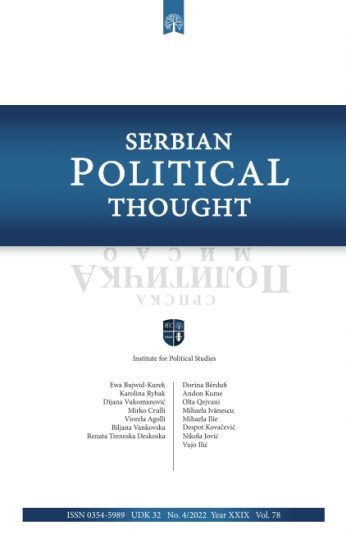Main topic
Serbian Political Thought
Attitudes and Happiness in Serbia
Abstract
The Annual Attitude Examination Survey consisting of 366 questions was deployed on nationally representative sample in Serbia to get 2608 valid inputs on the Oxford Happiness Inventory and Multiple Lickert scale questions concerning attitudes, fears, media use and closeness of different social categories to the participants. Research results confirm that happiness is affected by certain attitudes and characteristics of research participants such as those indicating openness to new experiences, being people loving, optimistic, positive, future and present focused, knowledge oriented, relaxed, creative, helping, just and empathetic. This is the first happiness research in Serbia. Future inquiries of this kind should be moved towards the Internet as a source of continuous data.
References
- Argyle, M., Martin, M., & Crossland, J. (1989). “Happiness as a function of personality and social encounters”, In J. P. Forgas, & J. M. Innes (Eds.), Recent advances in social psychology: an international perspective. Amsterdam: Elsevier.
- Bojic, L., Marie, J.-L. & Brankovic, S. (2013) “Reception and Expression Capabilities of Media Addicts in Serbia”, Kultura polisa, 10(22): 353-368.
- Branković, S. (2014) Metodologija društvenog istraživanja. Beograd: Zavod za udžbenike.
- Cheng, H. & Furnham, A. (2003) “Personality, Eelf-Esteem, and Demographic Predictions of Happiness and Depression”, Personality and Individual Differences, 34(6): 921-942. doi:10.1016/S0191-8869(02)00078-8
- Costa, P. T., & McCrae, R. R. (1980) “Influence of Extraversion and Neuroticism on Subjective Well-Being: Happy and unhappy people”, Journal of Personality and Social Psychology, 38(4): 668-678. http://dx.doi.org/10.1037/0022-3514.38.4.668
- Furnham, A. & Brewin, C. R. (1990) “Personality and happiness”, Personality and Individual Differences, 11(10): 1093-1096. doi:10.1016/0191-8869(90)90138-H
- Furnham, A. & Petrides, K. V., (2003) “Trait Emotional Intelligence and Happiness”, Social Behavior and Personality, 31(8): 815-823. doi:10.2224/sbp.2003.31.8.815
- Hayes, N. & Joseph, S. (2003) “Big 5 correlates of three measures of subjective well-being”, Personality and Individual Differences, 34(4): 723-727. doi:10.1016/S0191-8869(02)00057-0
- Headey, B. & Wearing, A. (1989) “Personality, life events, and subjective well-being: Toward a dynamic equilibrium model”, Journal of Personality and Social Psychology, 57:731-739.
- Lu, L., Shih, J.B., Lin, Y.Y. & Ju, L.S. (1997) “Personal and Environmental Correlates of Happiness”, Personality and Individual Differences, 23(3): 453-462. doi:10.1016/S0191-8869(97)80011-6
- McCann, J. H. S. (2014) “Happy Twitter Tweets are More Likely in American States with Lower Levels of Resident Neuroticism”, Psychological Reports: Relationships & Communications, 114(3): 891-895. doi:10.2466/21.09.PR0.114k25w1
- Spangler, W. D. & Palrecha, R. (2004) “The relative contributions of extraversion, neuroticism, and personal strivings to happiness”, Personality and Individual Differences, 37(6): 1193-1203. doi:10.1016/j.paid.2003.12.002

